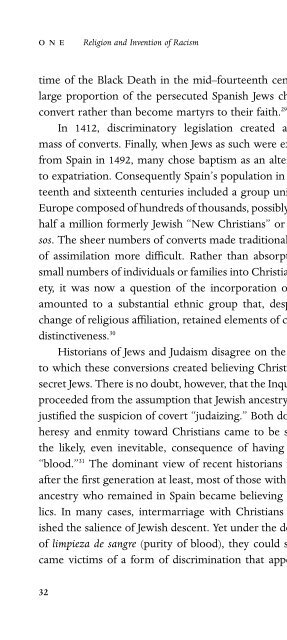Racism - A Short History - George M Fredrickson.pdf - WNLibrary
Racism - A Short History - George M Fredrickson.pdf - WNLibrary
Racism - A Short History - George M Fredrickson.pdf - WNLibrary
Create successful ePaper yourself
Turn your PDF publications into a flip-book with our unique Google optimized e-Paper software.
TWO The Rise of Modern <strong>Racism</strong>(s)<br />
loved liberty and showed an aptitude for self-government,<br />
not so much because these were universal human traits, as<br />
because their Anglo-Saxon ancestors invented democratic<br />
institutions in the forests of Germany, carried them to England,<br />
and then to the United States. Whether such Anglo-<br />
Saxon virtues were inherited in the blood or acquired<br />
through upbringing and education was an issue that was<br />
left unresolved during the antebellum period. Supporters<br />
of the Democratic Party, which appealed to Irish immigrants<br />
and kept alive the residue of Anglophobia left behind<br />
by two wars with England, preferred to think of a newly<br />
emerging “American race,” which would be a vigorous hybrid<br />
of all the European immigrant nationalities. But these<br />
same Democrats were likely to be white supremacists who<br />
were horrified at the prospect of any amalgamation of this<br />
emerging white American race with any non-European or<br />
colored races. 40<br />
Before the turn of the century, when advocates of restricting<br />
immigration from eastern and southern Europe<br />
began to promulgate the idea of northern European racial<br />
superiority, Americans tried to embrace the democratic<br />
universalism of the Enlightenment, while at the same time<br />
being proud bearers of a specific ethnoracial identity that<br />
was sometimes conceived of as Anglo-Saxon, sometimes as<br />
northern European, but most often as simply European or<br />
white. 41 The particularistic and universalistic impulses<br />
could be reconciled, at least superficially, if it were understood<br />
that the capacity for self-government, and the claim<br />
to equal political and social rights that went with it, came<br />
more naturally to some peoples or “nations” than to others.<br />
Germany by contrast came to embrace an ethnoracial<br />
74
















